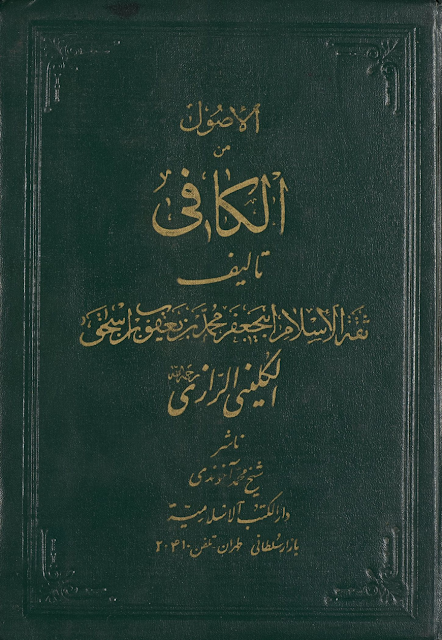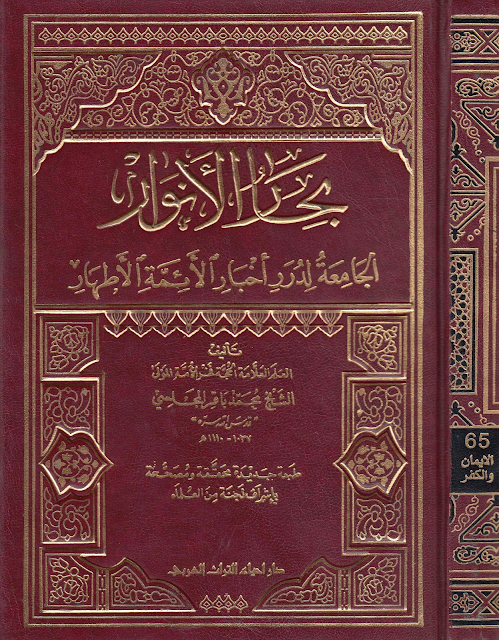7 - الحسين بن محمد، عن معلى بن محمد، عن أحمد بن محمد بن عبد الله، عن علي بن جعفر قال: سمعت أبا الحسن (عليه السلام) يقول: ليس كل من قال بولايتنا مؤمنا ولكن جعلوا انسا للمؤمنين.
Saturday, August 27, 2022
Not Everyone Is a Believer in the Wilayah
7 - الحسين بن محمد، عن معلى بن محمد، عن أحمد بن محمد بن عبد الله، عن علي بن جعفر قال: سمعت أبا الحسن (عليه السلام) يقول: ليس كل من قال بولايتنا مؤمنا ولكن جعلوا انسا للمؤمنين.
Rarer than the Philosopher's Stone
Nothing was Rejected as Much as Imamah
5 - قرب الإسناد: علي، عن أخيه موسى عليه السلام قال: كان يقول قبل أن يؤخذ بسنة إذا اجتمع عنده أهل بيته: ما وكد الله (6) على العباد في شئ ما وكد عليهم بالاقرار بالإمامة، وما جحد العباد شيئا ما جحدوها
Saturday, August 13, 2022
Calling People to this Command
يا ثابت مالكم وللناس، كفوا عن الناس ولا تدعوا أحدا إلى أمركم، فوالله لو أن أهل السماء وأهل الأرض اجتمعوا على أن يضلوا عبدا يريد الله هداه ما استطاعوا، كفوا عن الناس ولا يقول أحدكم: أخي وابن عمي وجاري، فإن الله عز وجل إذا أراد بعبد خيرا طيب روحه، فلا يسمع بمعروف إلا عرفه ولا بمنكر إلا أنكره، ثم يقذف الله في قلبه كلمة يجمع بها أمره (1).
Differences in Degrees of Belief
The Importance of Taqiyyah
Friday, August 12, 2022
He Violates all the Prohibitions
72 - محمد بن يحيى، عن أحمد بن محمد بن عيسى، عن الحسن بن علي بن فضال عن علي بن عقبة، عن عمر بن أبان، عن عبد الحميد الوابشي، عن أبي جعفر (عليه السلام) قال: قلت له: إن لنا جار ينتهك المحارم كلها حتى أنه ليترك الصلاة فضلا عن غيرها؟ فقال سبحان الله وأعظم ذلك ألا أخبركم بمن هو شر منه؟ قلت: بلى قال: الناصب لنا شر منه، أما إنه ليس من عبد يذكر عنده أهل البيت فيرق لذكرنا إلا مسحت الملائكة ظهره وغفر له ذنوبه كلها، إلا أن يجئ بذنب يخرجه من الايمان وإن الشفاعة لمقبولة وما تقبل في ناصب وإن المؤمن ليشفع لجاره وما له حسنة، فيقول: يا رب جاري كان يكف عني الأذى فيشفع فيه فيقول الله تبارك وتعالى: " أنا ربك وأنا أحق من كافى عنك فيدخله الجنة وما له من حسنة وإن أدنى المؤمنين شفاعة ليشفع لثلاثين إنسانا فعند ذلك يقول؟ أهل النار: " فما لنا من شافعين ولا صديق حميم (5) ".
Importance of Weapons and Being Prepared
Commentary:
The Condition of Tawhid
23 - حدثنا محمد بن موسى بن المتوكل رضي الله عنه، قال: حدثنا أبو الحسين محمد بن جعفر الأسدي، قال: حدثنا محمد بن الحسين الصوفي، قال: حدثنا يوسف ابن عقيل، عن إسحاق بن راهويه، قال: لما وافى أبو الحسن الرضا عليه السلام بنيسابور وأراد أن يخرج منها إلى المأمون اجتمع إليه أصحاب الحديث فقالوا له: يا ابن رسول الله ترحل عنا ولا تحدثنا بحديث فنستفيده منك؟ وكان قد قعد في العمارية، فأطلع رأسه وقال: سمعت أبي موسى بن جعفر يقول: سمعت أبي جعفر بن محمد يقول: سمعت أبي محمد بن علي يقول: سمعت أبي علي بن الحسين يقول: سمعت أبي الحسين ابن علي بن أبي طالب يقول: سمعت أبي أمير المؤمنين علي بن أبي طالب يقول: سمعت رسول الله صلى الله عليه وآله وسلم يقول: سمعت جبرئيل يقول: سمعت الله جل جلاله يقول: لا إله إلا الله حصني فمن دخل أمن من عذابي. قال: فلما مرت الراحلة نادانا. بشروطها وأنا من شروطها.
Thursday, August 11, 2022
There is Hope for Goodness if it is Small
Thiqat al-Islam Sheikh al-Kuleyni († 1104) :
Chapter: Intelligence of a Boy and Signs of his Nobility
1. Muhammad ibn Yahya has narrated from Ahmad ibn Muhammad and Ali ibn Ibrahim has narrated from his father from all from ibn Mahbub from Khalil ibn ‘Amr al-Yashkuriy from Jamil ibn Darraj who has said the following: “Abu ‘Abd Allah [Imam al-Sadiq] (a.s.) has said that ’Amir al-Mu’minin (a.s.) has said, ’If a boy’s scrotum is relaxed, his penis is small, his eyes are relaxed; then there is hope for goodness to come from him, as well as hope in safety from his evil. On the other hand if a boy whose scrotum is hard, his penis is large and has piercing eyes, he then is one in whose goodness there is no hope nor safety from his evil.’” [Furu' al-Kafi, Volume 6, Page 51]
(باب) * (التفرس في الغلام وما يستدل به على نجابته) * 1 - محمد بن يحيى، عن أحمد بن محمد، وعلي بن إبراهيم، عن أبيه جميعا، عن ابن محبوب، عن خليل بن عمرو اليشكري، عن جميل بن دراج، عن أبي عبد الله عليه السلام قال: كان أمير المؤمنين عليه السلام يقول: إذا كان الغلام ملتاث الأدرة (2) صغير الذكر ساكن النظر فهو ممن يرجى خيره ويؤمن شره، قال: وإذا كان الغلام شديد الأدرة كبير الذكر حاد النظر فهو ممن لا يرجى خيره ولا يؤمن شره.
Teknonym Yourself
Kissing the Brother
Naming them all Ali
Allamah al-Hurr al-'Amili († 1104) :
He did not Inform You in Order to Save You
5 - عدة من أصحابنا، عن أحمد بن محمد بن عيسى، عن علي بن الحكم، عن أبان قال: أخبرني الأحول أن زيد بن علي بن الحسين عليهما السلام بعث إليه وهو مستخف قال: فأتيته فقال لي: يا أبا جعفر ما تقول ان طرقك طارق منا أتخرج معه؟ قال: فقلت له: إن كان أباك أو أخاك، خرجت معه قال: فقال لي: فأنا أريد أن أخرج أجاهد هؤلاء القوم فأخرج معي قال: قلت: لا ما افعل جعلت فداك، قال: فقال لي: أترغب بنفسك عني؟ قال: قلت له: إنما هي نفس واحدة فإن كان لله في الأرض حجة فالمتخلف عنك ناج والخارج معك هالك وان لا تكن لله حجة في الأرض فالمتخلف عنك والخارج معك سواء. قال: فقال لي: يا أبا جعفر كنت أجلس مع أبي على الخوان فيلقمني البضعة السمينة ويبرد لي اللقمة الحارة حتى تبرد، شفقة علي، ولم يشفق علي من حر النار، إذا أخبرك بالدين ولم يخبرني به؟ فقلت له: جعلت فداك شفقته عليك من حر النار لم يخبرك، خاف عليك: أن لا تقبله فتدخل النار، وأخبرني أنا، فإن قبلت نجوت، وإن لم أقبل لم يبال أن أدخل النار، ثم قلت له: جعلت فداك أنتم أفضل أم الأنبياء؟ قال: بل الأنبياء قلت: يقول يعقوب ليوسف: يا بني لا تقصص رؤياك على إخوتك فيكيدوا لك كيدا، لم لم يخبرهم حتى كانوا لا يكيدونه ولكن كتمهم ذلك فكذا أبوك كتمك لأنه خاف عليك، قال: فقال: أما والله لئن قلت ذلك لقد حدثني صاحبك بالمدينة أني اقتل واصلب بالكناسة وأن عنده لصحيفة فيها قتلي وصلبي. فحججت فحدثت أبا عبد الله عليه السلام بمقالة زيد وما قلت له، فقال: لي: أخذته من بين يديه ومن خلفه وعن يمينه وعن شماله ومن فوق رأسه ومن تحت قدميه، ولم تترك له مسلكا يسلكه.
Grading:
Allamah Baqir al-Majlisi: Reliable like Authentic. موثق كالصحيح - [Mirat al-Uqul, Volume 2, Page 277]Behbudi: Authentic. صحيح [Sahih al-Kafi, Volume 1, Page 23]
No one is More Merciful
A man does such and such of Sins
142 عنه، عن ابن محبوب، عن محمد بن القاسم، عن داود بن فرقد، عن يعقوب بن شعيب، قال: قلت لأبي عبد الله عليه السلام: رجل يعمل بكذا وكذا فلم ادع شيئا إلا قلته وهو يعرف هذا الامر، فقال: هذا يرجى له والناصب لا يرجى له، وإن كان كما تقول لم يخرج من الدنيا حتى يسلط الله عليه شيئا يكفر الله عنه به، إما فقرا وإما مرضا (2).
The Fire and The One Described to be Upon This Command
143 - عنه، عن أبيه، عن حماد بن عيسى، عن إبراهيم بن عمر، عن أبي الصباح الكناني، قال: كنت أنا زرارة عند أبي عبد الله عليه السلام فقال: لا تطعم النار أحدا وصف هذا الامر فقال زرارة: إن فيمن يصف هذا الامر من يعمل موجبات الكبائر، فقال:
أو ما تدرى ما كان أبي يقول في ذلك، إنه كان يقول: إذا تاب الرجل منهم من تلك الذنوب شيئا ابتلاه الله ببلية في جسده، أو خوف يدخله عليه حتى يخرجه من الدنيا وقد خرج من ذنوبه (3).

















































